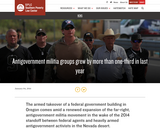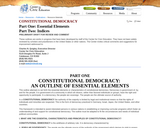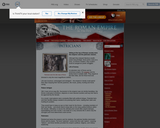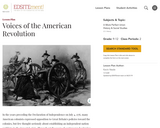
This parent guide supports parents in helping their child at home with the 7th grade Social Studies content.
- Subject:
- Social Studies
- Material Type:
- Reference Material
- Vocabulary
- Author:
- Kelly Rawlston
- Letoria Lewis
- Date Added:
- 10/12/2022

This parent guide supports parents in helping their child at home with the 7th grade Social Studies content.

This resource accompanies our Rethink 7th Grade Social Studies course. It includes ideas for use, ways to support exceptional children, ways to extend learning, digital resources and tools, tips for supporting English Language Learners and students with visual and hearing impairments. There are also ideas for offline learning.

This resource provides details on the growth of antigovernmental militia groups.

This resource outlines a constitutional democracy.

In this lesson, students will construct their own understanding of the purposes and powers of government by thinking through a scenario in which a group of people survive a near extinction-level but are returned to a life without government. This lesson is designed to help students understand why governments exist and why they are given certain powers.

In this lesson, students will draw connections between the formation of American political parties, political parties in other countries, and the concept of group work (its limitations and benefits). They will examine the tensions in early American history that led to the rise of political parties- the creation of a national bank, the relationship the young United States should have with its former enemy Great Britain, the size and strength of the national government versus the state government, agrarian society versus a manufacturing and commercial one, the Whiskey Rebellion, and perspectives on the French Revolution- and read primary source excerpts from the leaders of these nascent political parties- Thomas Jefferson, Alexander Hamilton, James Madison, and John Adams. Then students will bridge these rich details from early American history and apply some of the trends to political situations in other countries. They will end by considering the ramifications of
political parties and deciding if they are worth the trouble.

This resource is a collection of posters showing the struggles and triumphs of the life of Nelson Mandela. These posters are from around the world and show the international effort in dealing with South Africa in the late 20th Century.

This course was created by the Rethink Education Content Development Team. This course is aligned to the NC Standards for 7th Grade Social Studies.

This course was created by the Rethink Education Content Development Team. This course is aligned to the NC Standards for 7th Grade Social Studies.

This resource is about Roman society's elite class, the Patricians.

Many factors contributed to the eventual success of the American colonies as they revolted against British rule. American leadership, the timely support of international allies, and international respect and recognition played major roles in the struggle for independence. Several documents and engravings held by the National Archives help to illustrate these important factors that led to the founding of the United States.
This lesson focuses on the American Revolution, which encouraged the founding fathers' desire to create a government that would, as stated in the Preamble, insure domestic tranquility and provide for the common defense.

Students explore different facets of this historic relationship and give students a chance to predict what might come next. Students can begin by taking a journey across Cuba, compare it with life in their own hometown, and take part in a role-playing exercise on different perspectives in the United States-Cuba relationship

In this lesson students will be able to look at trade in Palestine to compare sources of power in various societies. They will explain how competition for resources affects relationships within and among nations by role playing the inequalities of trade in Palestine. By seeing the inequalities of trading, students will be able to understand the effects of conflict among regions.

This lesson helps students "hear" some of the diverse colonial voices that, in the course of time and under the pressure of novel ideas and events, contributed to the American Revolution. Students analyze a variety of primary documents illustrating the diversity of religious, political, social, and economic motives behind competing perspectives on questions of independence and rebellion.

In this lesson, students will explore the motives of Christopher Columbus's 1492 exploration, the controversy surrounding the changes Columbus's voyages initiated, and the impact of the Columbian Exchange on Native American cultures. Students participate in two simulation activities and a class discussion of these topics.